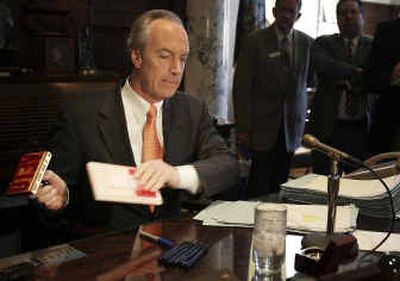Governor uses veto to punish House

BOISE – Gov. Dirk Kempthorne slammed his big, red VETO stamp down on eight House bills Thursday and declared that every House bill he is sent from now on will be “veto fodder” until recalcitrant House members pass his $1.6 billion statewide highway bill.
The measure, which includes major upgrades to U.S. Highway 95, calls for doing 30 years of highway construction in the next 10 years, by bonding against future federal highway allocations. It’s a centerpiece of Kempthorne’s agenda this year, but on Wednesday, the House Transportation Committee voted 9-5 against moving ahead with it, at least for now.
Legislators won’t be finishing their session – which they had hoped to wrap up before today – until they work with Kempthorne on the road bill, he warned. “I’m willing to stay as long as it takes,” he said. “So I’m going to take care of some of these House bills.”
That said, he slammed the VETO stamp onto each of the eight bills, one after another. “And I’ve got a whole lot of other bills I can take care of,” Kempthorne warned, pointing to a stack of 47 other House bills that await his signature. “It is time for us to have cooperation.”
The vetoed bills dealt with everything from agriculture to parks to child protection to income taxes. “Some of ‘em have merit,” Kempthorne said.
Most of the bills were sponsored by House opponents of the road bill. Two were sponsored by Rep. Ken Roberts, R-Donnelly, a vocal opponent, and one by Rep. Janice McGeachin, R-Idaho Falls, a close ally of Roberts.
McGeachin reacted angrily with a written statement that she looks forward “to working with a future governor who believes in the principles of limited government, individual responsibility and fiscal conservatism.”
Rep. JoAn Wood, R-Rigby, chairwoman of the Transportation Committee, also was angered by the governor’s move. Asked at mid-day if her committee would meet again soon, she responded, “We would if we had anything to do.”
House Speaker Bruce Newcomb said, “It’s not their day.”
Wood said, “We’ve offered some compromises, which evidently the governor is not going to take, because he’s decided to go the route of vetoing bills.”
House members had talked of ideas like cutting out some or most of the projects in the roads program, and capping the money that could be spent at less than Kempthorne envisions.
Kempthorne said, “That is legislation … that provides for the safety and well-being of our citizens when they travel the highways. … I am determined that we are going to connect Idaho.”
Highway 95, the accident-plagued road that is the state’s only north-south highway, would be a big beneficiary of the plan.
As the day wore into evening, many House members were still at their desks on the House floor, watching a Boise TV station’s Web-site video of the governor taking his forceful stance. Wood; Rep. Eric Anderson, R-Priest Lake; and Rep. Cliff Bayer, R-Boise, huddled around Bayer’s computer. When the VETO stamp pounded, all looked shocked.
When Kempthorne, on the video, said his highway plan would improve safety, Wood gasped. “This bill has nothing to do with safety on highways,” she said. And when the governor talked about the need for cooperation from House members, Wood showed more agitation. “We’ve been trying all day,” she said, shaking her head in disbelief. “He’s the one that won’t move.”
The highway bill, SB 1183, earlier passed the Senate on a 30-4 vote.
Rep. George Eskridge, R-Dover, said, “With a little compromise on each side … we could go home. But apparently the governor doesn’t want to move. The bad thing is, it’s costing taxpayers $30,000 a day for these games to be played.”
That’s the estimated cost for the Legislature each day it’s in session.
Rumors swept through the state Capitol late in the day that the House would start trying to override the governor’s vetoes, which can happen by a two-thirds vote in each house. But Newcomb downplayed that idea. “No, we’re going to wait and see,” he said. “We’re flexible, but I’m hoping that statesmanship will step up and people will learn to compromise.”
Asked if the House Transportation Committee would meet again today, Newcomb said, “I would suspect they will.”
Senate Majority Leader Bart Davis said Thursday night on his way out of the Capitol, “The Senate is not inclined to override vetoes at this time.”
Meanwhile, Kempthorne warned lawmakers that he had more vetoes ready to go this morning “if a clear path forward for SB 1183 is not identified by lawmakers.”
In his official veto message, he wrote, “As the House continues to deliberate over the next several weeks, I would encourage you to move quickly to consider Senate Bill 1183 and pass such without amendment.”
Not in the governor’s possible-veto stack are four bills implementing a multimillion-dollar southern Idaho water settlement and funding North Idaho water projects. They’re House bills, but they’re waiting right now on the Senate calendar, and haven’t been voted on yet there. “The indication I’ve gotten from the Senate leadership is that they may not take up the water bills so that they can protect them,” Kempthorne said. “That’s probably a good idea.”
The Associated Press contributed to this report.